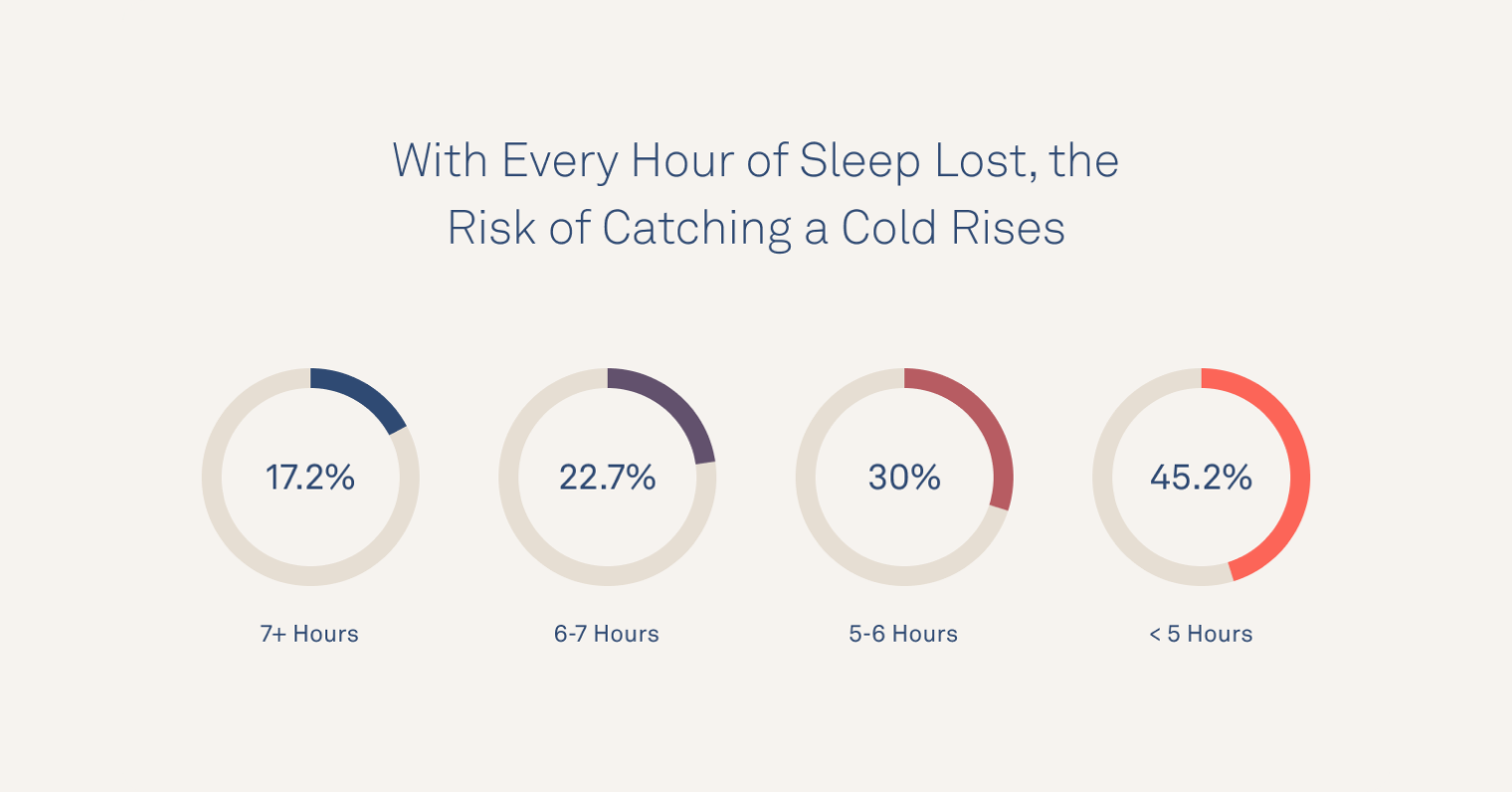In your body’s battle against foreign invaders, sleep is your armor.
One of the many significant (yet often overlooked) consequences of poor sleep is its effect on your immune system. Research shows that people who are sleep deprived, or consistently miss out on quality sleep, are not only more likely to get sick after being exposed to a virus, but their bodies take longer to recover when they’re hit with an illness.
While stocking up on sleep can’t always prevent you from getting sick, it’s a key way to ensure your body is armed and ready to defend against what comes its way. Here’s what you need to know.
| Member Tip: Spot sickness before it slows you down. Oura’s Symptom Radar feature can help you detect signs that you may be getting sick, so you can proactively prioritize rest and recovery. |
Does Sleep Deprivation Lower Immune Function?
Yes. When you don’t get enough sleep, your immune system is weakened. Getting enough quality sleep strengthens your immune system by supporting cytokine production, T-cell activation, and inflammation control—all key processes that help your body fight infections and recover faster from illness.
In the short term…
Research shows that individuals who sleep 6 hours or less a night are more than 4 times as likely to catch a cold as those who sleep 7+ hours. With every hour of sleep lost, the risk of catching a cold continued to rise.
Skimping on sleep has also been shown to affect the effectiveness of one of the most important illness-prevention techniques we have: vaccines. One study showed that people who slept fewer than 6 hours on average were far less likely to show the antibody response that a vaccine is designed to trigger. Sleep-deprived individuals were 11.5 times more likely to be left unprotected by the vaccine than people who were getting 7+ hours of sleep.
READ MORE: The Surprising Link Between Sleep & Vaccines
Plus, it’s not just colds and flu that a good night’s sleep can help you avoid. Research has shown a close connection between circadian rhythms and allergies, suggesting that sufficient sleep has important implications for reducing the frequency and severity of allergic reactions.
In the long run…
Sleep deprivation has been shown to increase the risk of chronic diseases such as diabetes and heart conditions. (Learn more about how sleep affects heart health here.) Reason being: A lack of sleep leads to inflammation, which is the root cause of many illnesses and conditions.
In healthy people, sleep helps the body repair itself and reduce inflammation; for those who aren’t getting enough sleep, inflammation continues to build up, leading to an increased risk of a host of other health issues, including neurodegenerative disorders like Alzheimer’s and mental health conditions such as depression.
While there is conflicting research on the impact of sleep and cancer, one study suggested that sleeping less than six hours per night can raise the risk of chronic disease, particularly cancer and stroke.
What Happens During Sleep? The Power of Sleep for Immune Function

Although your immune system functions throughout the day, nighttime offers a unique opportunity for it to act without being disrupted by meals, movement, or other tasks. Your immune system requires a lot of energy to power its activities, so it takes advantage of reduced demands from the rest of your body during sleep.
As your immune system ramps up its nightly activity to defend your body, all that fighting releases chemicals, some of which cause inflammation. As a result, you may experience stronger symptoms of illness—including fever, congestion, body aches, or sore throat—when your immune system is hard at work. Sometimes feeling worse at night, or first thing in the morning after all this activity, is a sign that your body is working harder to help you get better.
Your immune system’s reactions are incredibly complex and have led to a growing field of research.
Your system is made up of a complex team of cells and proteins that work together to keep foreign invaders (such as colds or flu) at bay.
At night, these systems work to strengthen your defenses by:
- Turning up the heat: Your body can create a fever to help fight infection by deliberately raising your body temperature to an inhospitable level for pathogens (invaders) to reproduce. However, this comes at a high energy cost. Even a 1°C rise in body temperature requires a 10–12.5% increase in metabolic rate. This makes nighttime the perfect opportunity to use fever tactics because your body has more energy resources available when you’re powered down for sleep.
- Prioritizing repair and restoration: Many illnesses cause your body to rearrange sleep stages, increasing the time spent in NREM (deep) sleep while de-prioritizing REM (rapid eye movement) sleep. The benefits are two-fold. First, NREM sleep primarily focuses on bodily repair, while REM is centered on cognitive benefits. A body at war needs more frequent repairs to recover. Second, temperature regulation is disrupted during REM sleep, and your body needs to remain in NREM longer to sustain a fever.
- Releasing the messengers: Cytokines are proteins that act as the primary messengers of the immune system. They send signals throughout your body to orchestrate immune responses, turn on and off specific defense systems, and promote different phases of sleep. Cytokines are produced and released during sleep, making it crucial to get shut-eye when you’re sick.
- Supercharging the attack: Specialized cells, known as T-cells, primarily work on the front lines, where they recognize and kill infected cells. Like some animals, certain cells hunt best at night. Research has shown that sleep helps increase T-cells’ ability to ‘stick’ to target cells—making them more effective and lethal.
Even when you’re lying in bed, these systems are hard at work fighting a battle on a cellular level. Understanding how hard your body is working can help you effectively prioritize sleep.
If You Feel Like You’re Getting Sick…
If you’re concerned and feel like you’re getting sick, keep an eye out in your Oura App for these signs of strain. Remember to compare them to your normal baselines.
- Symptom Radar showing signs of strain
- Decrease in heart rate variability
- Increase in resting heart rate
- Increase in respiratory rate
- Increase in body temperature
Keep in mind, if you do start feeling under the weather, you’ll be able to bounce back faster if your body is well-rested.
READ MORE: How Oura Can Help Monitor Illness
How to Support Your Immune System
You can also support your immune system by being mindful of your daily routine and giving it the fuel it needs to be prepared to take on any threat:
- Stay hydrated
- Stock up on immune-boosting nutrients (zinc, vitamin C, etc.)
- Avoid alcohol
- Eat a well-balanced diet
- Make time for hobbies that reduce stress
- Keep active
The beginning of flu season or the presence of a new illness may be out of your control, but by preparing your body to take on any looming threats, you are already a few steps ahead. Prioritizing sleep is key, and those 7+ hours can make all the difference in the battles your immune system fights on your behalf.












